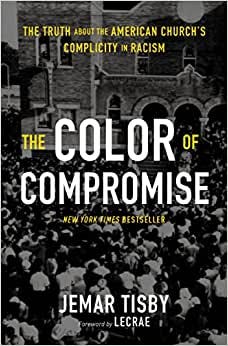Book Review(s): Two books by Jemar Tisby
I'm cheating by reviewing two books together today, and that's unfair to both books but we'll all survive. The first of the two books is "The Color of Compromise: The Truth about the American Church's Complicity in Racism".
CoC is essentially a history book. I confess, my overall knowledge of US history is limited, and although it's better than the average Australian's, there's a lot of lacunae. In particular, I think that Australians (and plenty of Americans too, let's be honest), think of the issues of slavery and racism as "The US had slavery, they had a civil war, the slaves were freed, and then there was some racism, but the Civil Rights movement sorted that all out". Okay, that's a huge simplification, but it's not that far off.
What CoC did for me is it took me through a narrative of racism in the US. Tisby in particular is keen to focus on the church's complicity in this - everything from active participation and promotion, through to tacit compliance. Tisby writes this as a Christian though. And his hope is that truth-telling about the past, can promote genuine reconciliation and racial justice in the future.
The course of the book is obvious in one sense - he begins with how "race" as a category was constructed in the colonial era, how it was enshrined in the US, how the liberty of the American Revolution was racialised liberty; he talks frankly about Jonathan Edwards and George Whitefield - those shining models of the Great Awakening, both slaver-holders; In Whitefield's case, the tragic story of how Whitefield's desire to found an orphanage in Georgia led in turn to him playing a pivotal role in shifting Georgia from a free territory, to a slave state.
We are taken then through the antebellum period, the Civil War, and then how White Supremacy was put back together in the Jim Crow era as a (violent and deadly) reaction to Reconstruction. I was shocked to learn of how much general progress was made during Reconstruction, and then to realise how harsh, and how utterly evil, the Jim Crow period was. I also didn't realise the extent, vehemence, and sheer toll of black lives lost to lynching.
Tisby is not vengeful in his pursuit of Christian complicity, because it's not hard to find it, and it doesn't take much to indict it. He gives due attention in turn to complicity to racist practices in the North, especially in the wake of the Great Migration; he also gives a treatment of how the (moderate) church was complicit during the Civil Rights era. This includes a balanced, but worthy, critique of Billy Graham. Once more we are (and ought to be) reminded that there are no true Christian heroes except Christ.
The book was published in 2019, and comes right up to Black Lives Matter, though plenty has happened in the last three years too. Tisby closes with a clear and urgent call for action on racial justice, which leads directly into his second book, "How to Fight Racism: Courageous Christianity and the Journey toward Racial Justice" (2021).
Here Tisby gets practical. He outlines a threefold 'model' that he uses to discuss working for Racial Justice, the "ARC" - Awareness, Relationships, Commitment.
Awareness is really about getting educated. Tisby provides a theological treatment of the Image of God, in relation to Race, and a theoretical framework for discussing Race, before delving into topics of Racial Identity and History.
Relationships talks about how you go about, at a personal and corporate level, working towards reconciliation. Tisby rightly offers some critique of simplistic models of relational reconciliation (just get some minority friends), and failed applications (reconciliation as "minority groups integrate into majority culture groups and do what the majority does), offering instead robust practices including the practice of lament, corporate confession of past and present racist sins, dealing with a church or denomination's racist past, as well as how to practically but responsibly develop friendships across racial divides.
Commitment takes us to questions of lifelong struggle, activism, and resources. Here he grounds fighting for racial justice in love for God and for neighbour, as well as bearing witness for Christ, before going on to practical suggestions for activism, as well as the broader challenge of dismantling structural and systemic racism.
I've read a few books now that cover this topic (Daniel Hill's White Awake and White Lies, and Edmondson and Brennan's Faithful Anti-Racism), and I think Tisby's tripod model is well thought-through. E&B's book is good too, but different - it's built off research (Brennan having done research with Emerson, of "Divided by Faith" fame), it's co-written by a Black woman and a White man, and it's a combination of "here's what you should do, here's research, and here's some stories".
I also have really just come to appreciate Jemar Tisby more broadly. He's the co-host of one of the few podcasts I regularly listen to (Pass the Mic, with Tyler Burns), founder of The Witness: A Black Christian Collective), and a socially and politically engaged, relatively theologically conservative, historically informed, Black Christian voice.



